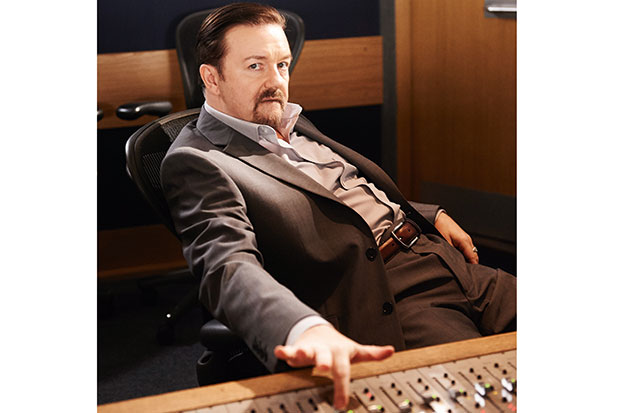I should probably nail my colours to the mast and state that The Office is possibly my favourite TV sitcom of all time (bar My Family, which surely goes without saying), but some comedies that have ended should simply stay ended, as no one has ever said, but should have. (Or maybe John Cleese has said it?) There are a few decent jokes here. Some of the bad songs are really good bad songs. But it’s a repetitive rehash rather than a worthwhile continuation of the character, and the comedy and pathos is in exactly the same place as it always was. That is, in the gap between the winner David Brent (Ricky Gervais) thinks he is, and the loser we know him to be. Fifteen years ago, that was revolutionary, and genius, and funny, and affecting, but now? Not so much. Quite tiresome, in fact.
This is written and directed by Gervais, with no input from his Office co-writer, Stephen Merchant. (I’ve read they fell out. May be true, may not be true. Haven’t the faintest. No one tells me anything.) The TV series, you may remember, left Brent on a high — he told Finchy to eff off, he charmed a lady and, most importantly, he exited with dignity — but the intervening years have not been kind to him. He is now a lowly sales rep with a company that sells cleaning and feminine hygiene products. You wouldn’t think Tampax would need much selling, but here he is: ‘One size fits all… no, it doesn’t actually.’
It’s business as usual, mockumentary-wise, as Brent shoots furtive little looks at the camera, and the camera often painfully lingers for just a beat too long. And it’s business as usual narratively, as he tours the office and makes excruciatingly inappropriate jokes while introducing us to the various characters, including a woman who appears to be smitten with him, for reasons that are unfathomable, but you just have to buy. He is single but, naturally, insists he’s had plenty of action over the years: ‘I’ve dated big girls and small girls and rich girls and poor girls and white girls and… fat girls.’ One fat girl, he continues, was one of those fat girls that everyone said would be a stunner if she lost weight. She did lose weight ‘and she wasn’t a stunner. Disappointing.’ I laughed at that, I confess, just as I laughed at the Tampax, even though that’s no laughing matter. Wrong size and you’re in trouble for the rest of the day.
Brent’s dream is still to become a pop star so, figuring his time is running out, he decides to take unpaid leave, cash in his pension, put a band together, hire one of those big rock star buses and embark on tour. From this point on, its all Travelodges and Costa Coffees as the band, Foregone Conclusion, endlessly play empty venues or ones populated by a few people who look disgusted and then leave. Once or twice, fair enough, but by the fifth time it’s feeling tired, stretched, lame, even though there’s a sixth time to come, and a seventh.
Brent experiences humiliation after humiliation. The band members despise him and won’t even drink with him unless they are paid. (£25 an hour. Each). Their gigs are all confined to the immediate Slough area so, it transpires, it would have been quicker for everyone to have simply gone home at night rather than hire that big bus and stay in Travelodges. The women he picks up want him solely for his mini-bar. The really good bad songs? They include ‘Native American’ (‘soar like an eagle/sit like a pelican’) and ‘Slough’ (‘And you know just where you’ll be heading,/it’s equidistant ’tween London and Reading’). They are really good bad songs in the sense they are tuneful (remarkably) and Gervais can sing (remarkably), but they wear thin. (Did he have to sing quite so many, in full?)
There is not an ensemble effort. There is no Tim, no Dawn, no Gareth, no Big Keith and no equivalents. The band members are purely functional and aren’t awarded personalities. The rapper (played by Doc Brown) who has been persuaded to perform with Brent has more to say, but is still chronically underdeveloped. A PR in the form of Diane Morgan (aka Philomena Cunk) appears then disappears. Brent’s story arc follows that of the TV series, and leads to redemption, but here it is cynically and sentimentally achieved, and unearned. We are told to feel for him, in effect. But I was only bored of him by then. Some comedies that have ended should stay ended. And this is one of them.
The post Business as usual appeared first on The Spectator.
Got something to add? Join the discussion and comment below.
Get 10 issues for just $10
Subscribe to The Spectator Australia today for the next 10 magazine issues, plus full online access, for just $10.
You might disagree with half of it, but you’ll enjoy reading all of it. Try your first month for free, then just $2 a week for the remainder of your first year.














Comments
Don't miss out
Join the conversation with other Spectator Australia readers. Subscribe to leave a comment.
SUBSCRIBEAlready a subscriber? Log in